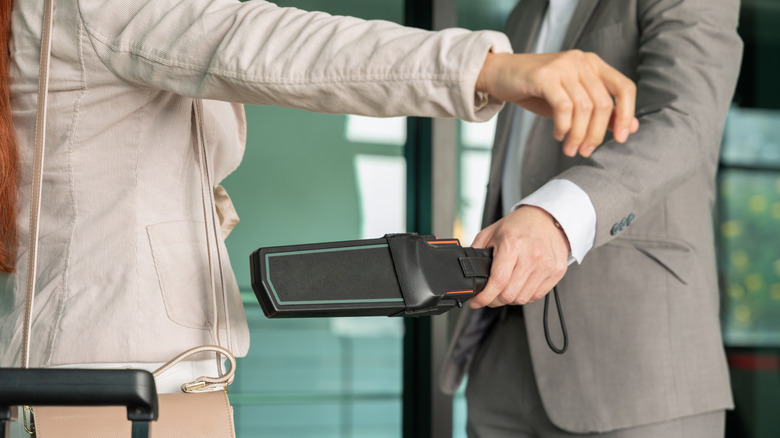The Fashionable Accessory That Might Cause Annoying Problems At The Airport
For many travelers, the airport is the exciting gateway to adventure, but for others, it can be a source of stress, with long lines, crowded terminals, and the complexities of security checks. There are plenty of hacks you can use to help you zip through TSA, some of which will allow you to avoid airport security mistakes that slow you down and enable you to streamline the process. Some tips, such as bringing an empty water bottle to the airport, can even save you money on your trip, too. However, some travelers still find themselves caught off guard when it comes to airport security, particularly by issues related to body piercings.
Body piercings are a popular form of self-expression and may seem like a minor detail, but they can cause unexpected complications at airport security. Whether you're traveling with newly pierced ears, sentimental pieces of jewelry, or a discreet piercing you'd prefer to keep private, it's worth knowing how metal detectors at airports work and what to expect.
For those wondering if their body jewelry will set off metal detector alarms — or want to know how to handle the situation if it does — this guide breaks down the essentials. From understanding what types of metal are more likely to trigger alarms in security to deciding whether you should remove your jewelry in advance of flying, this information will ensure that your accessories don't cause any unexpected problems. Here's what you need to know before your next trip.
What metals set off metal detectors?
Airport security uses metal detectors as part of a comprehensive system to ensure passenger safety. These detectors operate by generating electromagnetic fields. When a person or item moves through the detector, the field penetrates the surface, and any metal present disrupts it by creating a secondary electromagnetic field. The detector then registers this disruption and emits an alert.
The type of metal being scanned plays a significant role in whether or not an alarm is triggered. More advanced metal detectors can tell the difference between high value metals like gold versus iron, for example. Fine jewelry, such as gold and silver, rarely causes issues because these metals are less conductive. Problems are more likely to arise with metals such as titanium or stainless steel, which are often used in medical implants (such as metal plates or screws). Large quantities of metal, like bracelet stacks or a watch with a significant metal case, are also more likely to trigger alarms.
For most travelers, small body piercings are unlikely to cause any trouble. However, the sensitivity of metal detectors can vary by airport. Understanding how metal detectors work and knowing which materials might cause problems can help reduce anxiety during the screening process.
Should you remove body piercings before flying?
The Transport Security Administration (TSA) acknowledges, "Certain metal body piercings may cause the machines to alarm and a pat-down may be required. If additional screening is required, you may be asked to remove your body piercing in private as an alternative to the pat-down." While this scenario is uncommon, it's helpful to be prepared.
For most travelers, leaving piercings in place is perfectly fine. Single pieces of small jewelry are unlikely to set off any alarms, and even if they do, the process typically adds only a few extra minutes to the overall airport screening process. For those with new piercings that cannot be removed, or those wearing sentimental or hard-to-remove pieces, it's important to plan ahead accordingly. Explaining your situation to TSA officers can often resolve the issue quickly.
If you're concerned about delays, consider swapping metal piercings for non-metal alternatives, such as acrylic or plastic, before heading to the airport. For valuable pieces of jewelry, placing it in a travel pouch and sending it through the X-ray machine may be the safest option. Rest assured, body piercings are generally seen as low-risk items when it comes to airport security, and staff are well-trained to handle such situations efficiently.


